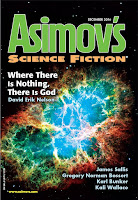
(Post Singularity) James seeks fulfillment through his sculpture, even though it all seems pointless in a perfect world run by Ais. (12,234 words; Time: 40m)
Rating: ★★★★★ Moving and thought-provoking
Recommended By: SFRevu:4 GDozois:5 RHorton:4 NClarke Readers"They Have All One Breath," by Karl Bunker [bio] (edited by Sheila Williams), appeared in Asimov's Science Fiction issue 12|16, published on October 27, 2016 by Penny Publications.
Mini-Review (click to view--possible spoilers)
Pro: James wants to do something worthwhile, and he believes finishing his sculpture, Geckos, will satisfy his needs. It won't bring his wife back, but, in a way, it'll address her biggest complaint--that he's content to be a "pet" for the machines. But, on reflection, he decides that the machines are just humoring him by letting him think he's doing something worthwhile, so he decides to smash his work, that being the only thing he can do that's part of his program, not theirs.
And they "zap" him to save the artwork. This is profound because it tells him that the machines value art but cannot create it. This is consistent with the ugly things we see the AIs create (when not making perfect copies), such as the fake animals. When James rises from the floor in the final scene, his life has real purpose again, and the story concludes.
James's character development is one of the story's strong points. From his experience with his mother's attempt to keep all animals alive, to his wife's rejection of the AIs, to his unending grief over the loss of his love and of the child they never had, we get a strong feeling for what sort of man he is, and we're deeply sympathetic to his plight. He deserves to find meaning in his life, and it's an emotional kick when he does.
The story makes a strong point that eradicating all suffering--human and animal alike--is not a worthy goal.
Although the author makes reference to The Machine Stops, by E.M. Forster, a better comparison would be to With Folded Hands, by Jack Williamson, which is another story where robots commanded "to serve and obey and guard men from harm" conclude that they need to take control of the world to do so, and, in the process, make life not worth living.
Con: Lisa, as seen through James's eyes, is a cardboard character, and it's hard to tell what he sees in her.
Even in a post-scarcity world, you'd still expect to have a need for a government and various sorts of human services.
Other Reviews: Search Web, Browse Review Sites (Issue 12|16)
Karl Bunker Info: Interviews, Websites, ISFDB, FreeSFOnline
Follow RSR on Twitter, Facebook, RSS, or E-mail.
And they "zap" him to save the artwork. This is profound because it tells him that the machines value art but cannot create it. This is consistent with the ugly things we see the AIs create (when not making perfect copies), such as the fake animals. When James rises from the floor in the final scene, his life has real purpose again, and the story concludes.
James's character development is one of the story's strong points. From his experience with his mother's attempt to keep all animals alive, to his wife's rejection of the AIs, to his unending grief over the loss of his love and of the child they never had, we get a strong feeling for what sort of man he is, and we're deeply sympathetic to his plight. He deserves to find meaning in his life, and it's an emotional kick when he does.
The story makes a strong point that eradicating all suffering--human and animal alike--is not a worthy goal.
Although the author makes reference to The Machine Stops, by E.M. Forster, a better comparison would be to With Folded Hands, by Jack Williamson, which is another story where robots commanded "to serve and obey and guard men from harm" conclude that they need to take control of the world to do so, and, in the process, make life not worth living.
Con: Lisa, as seen through James's eyes, is a cardboard character, and it's hard to tell what he sees in her.
Even in a post-scarcity world, you'd still expect to have a need for a government and various sorts of human services.
Other Reviews: Search Web, Browse Review Sites (Issue 12|16)
Karl Bunker Info: Interviews, Websites, ISFDB, FreeSFOnline
Follow RSR on Twitter, Facebook, RSS, or E-mail.
I really liked the world and wanted to explore it more, especially the hints that the AIs may be smothering the world in their desire to save it, but the main character didn't grab me.
ReplyDeleteI agree with RSR's ★★★★★ rating. It's a memorable utopian horror story where our chaotic world segues to a sandboxed world (like a pacifist videogame) with no human and animal violence and our basic needs are met by unexplained nanobots. Interesting issues are explored through a well-written, believable relationship between a sculptor and his girlfriend.
ReplyDeleteMy main complaint is the story emphasizes the negatives in the transition to a post-scarcity world. I believe there's a large net positive to the economy and people's lives when you take into account the increase in demand for entertainment, travel, and knowledge. Basically, everyone now can spend their whole life on self-actualization, not just the first and last quarters of their life. Everyone who's ever wanted to become an artist, scientist, teacher, volunteer can try without starving, and everyone else will have the time to appreciate their work.
Now reprinted at Clarkesworld:
ReplyDeletehttp://clarkesworldmagazine.com/bunker_01_19_reprint/